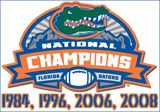Why I’m Not (That) Worried
First of all, Scully’s observations of our offensive woes are well taken.
I’m just here now to tell you it doesn’t matter. Or at least, it doesn’t matter much.
I did a piece preseason laying out the statistical characteristics of BCS champions. Based on that evidence, we are still in very good shape.
In examining past BCS Champions, I noted categories of stats that weren’t only unimportant, they were actually the least related to eventual BCS success. Those statistics were –
Passing Offense
Total Offense
Penalty Yards
Kick Returns
I’m not going to bother with kick returns, where we actually rank outstanding nationally at 8th with 27.25 yards per return. Likewise, we are having an unusually good year when it comes to penalty yards at 12th nationally and only 42.29 yards per game.
Neither of those stats is much related to BCS success anyway.
For the two offensive categories mentioned – Passing Offense and Total Offense – I have previously noted that they aren’t very important to eventual BCS success. In the case of Passing Offense, the average BCS champion has ranked 42.5 nationally at 237.2 yards per game. Of the 15 statistics I examined, Passing Offense ranked 13th in importance.
Right now the Gators are 80th in this category, at 198.7 yards per game. Not good, but better than some eventual champions, like Ohio State in 2002 that ranked 92nd in the country in passing offense with only 173.2 ypg. And last season’s champion Gators were ranked only 61st in the nation in passing yardage per game at 213.9. There is room for improvement, but no need to panic.
As for total offense, it ranks 9th in importance of 15 categories. This year’s Gators, due to their outstanding run offense (6th in the nation at 258.3 ypg) are 8th nationally, at 457 yards per game.
That’s right – our much maligned offense ranks 8th in the nation in yards per game.
What about the statistics that really matter to BCS champions?
To reiterate, the most important statistics (in ascending order of importance) are –
Passing Efficiency
Pass Efficiency Defense
Total Defense
Scoring Defense
Where would the current Florida team rank among BCS winners statistically in these categories at the present time?
Only the best team ever.
Here are the average rankings and stats for past champions -
Passing Efficiency 12.3 (150)
Pass Efficiency Defense 6.7 (95.33)
Total Defense 8 (281.6)
Scoring Defense 5.4 (13.9)
And Florida’s current stats in these categories –
Passing Efficiency 12th (156.07)
Pass Efficiency Defense 1st (86.83)
Total Defense 1st (229.6)
Scoring Defense 2nd (10.14)
(That last category is made all the worse by the two pick-sixes Tebow threw last game, which count against this stat. In reality our defense gave up 6 points Saturday.)
The only BCS Champions who are close to these rankings are the 2001 Miami team, who was 1st in Scoring and Pass Efficiency Defense, 6th in Total Defense, and 15th in Passing Efficiency, and the 2003 LSU team, which was 1st in Scoring and Total Defense, 2nd in Pass Efficiency Defense, and 11th in Passing Efficiency. Yet in both cases their highly ranked Total Defense was worse than Florida currently – 270.9 yards per game for Miami and 252 ypg for LSU, to 229.6 for UF right now.
Now I wish our offense was more effective and I agree with Scully’s points. I also wish our games could be a bit more … relaxing. Finally I realize that the way we are playing gives us little margin for error.
But if it is going to get done this year, like 2006 it is going to have to be the defense that gets it done. (In many ways, like last year too).
This is a championship defense. If they bring it home, it’s time Charlie Strong and his boys get their due recognition.





 Mentioned in Austin Murphy's book
Mentioned in Austin Murphy's book 


7 comments:
Gator fans can also reassure themselves by checking out this power ranking by Ed Gunther over at the National Championship Issue.
The stats still have Florida in a pretty comfortable position.
So , that leaves the Gators as being one of the best teams in the nation statistically, that can't score in the red zone...
Sorry, Mergz - gotta throw some cold water on your analysis.
First, you're only comparing Florida to the 11 BCS champions of 1998-2008. No mention of teams that were better than those champions in the categories you focuses on. If the BCS champions were #1 in all categories you mention, your analysis would be valid. But while the champs those years were good, there were a lot of teams that were better.
If we just look at two of those categories, Total D and Scoring D, here's where some of those BCS champions fall in each of their respective years:
2000 Oklahoma: #7 Total D, #5 Scoring D, #13 SoS
2001 Miami: #6 Total D, #1 Scoring D, #19 SoS
2002 Ohio State: #23 Total D, #2 Scoring D, #18 SoS
2003 LSU: #1 Total D, #1 Scoring D, 15# SoS
2004 USC: #6 Total D, #3 Scoring D, #18 SoS
2005 Texas: #10 Total D, #8 Scoring D, #7 SoS
2006 Florida: #6 Total D, #6 Scoring D, #1 SoS
2007 LSU: #3 Total D, #17 Scoring D, #14 SoS
2008 Florida: #9 Total D, #5 Scoring D, #25 SoS
If nothing else, rankings like Ohio State's Total D in 2002 and LSU's Scoring D in 2007 skew the overall "BCS champion" average you're pitting Florida against, boosting those averages up.
So the statement "best team ever" is sketchy at best, and based on a a flimsy premise at worst.
Now if you were to say something to the effect of, "If Florida wins the BCS championship this year, and if their stats continue to be this good, they'll have posted better stats than all of the previous BCS champions", that might be true. But that's a long way away.
But even then, part of the reason is because according to the NCAA, Florida's SoS this year would be the weakest by far of a BCS champion. Based on past opposition, they're #16, but on future opposition they're #102. Cumulative opposition puts them at #62, 37 spots worse than the worst BCS champion. (http://web1.ncaa.org/d1mfb/2009/Internet/toughest%20schedule/fbs_9games_cumm.pdf)
As a commenter pointed out though, my post yesterday shows that Florida's D this year compared to all other teams this year is stellar. That's what should make you feel good about your chances, if anything.
Trader Rick –
It is true that our recent efforts in the red zone have been dreadful. That said our Scoring Offense still ranks 9th nationally at 35.29 ppg. And yes, much of that scoring came against pretty lousy teams. But so did the scoring of the teams above us, like Texas who is number 1 at 41.86 ppg.
We still need to do a better job of putting it in the endzone.
Ed,
My initial analysis was on the “Statistical Characteristics of BCS Champions”. (See the linked article). This was done by looking at 15 NCAA statistical categories and seeing which categories were, when averaged by rank, most “important” to BCS success. For example, the winners commonly had high Defensive Scoring rankings (the number 1 factor), but a stat like, saying Passing Offense, was virtually irrelevant. I also looked at standard deviation to see how much variable there was between champion teams. Scoring D was the least variable.
I’ve run these numbers in articles so many times that I probably didn’t do a great job in this one explaining how important, or at least commonly held, they are. For instance, a highly ranked Passing Offense is so irrelevant that the highest ranked winner ever only came in 13th (USC ’04). The average Passing Offenses to win is 42nd overall.
Now I don’t disagree that 11 is a small sample size. But to merely say OSU’s ’02 and LSU’s ’07 skew the numbers dramatically isn’t right either. Think about that for a second – the WORST Scoring Defense ever to “win it all” was 23rd. 23rd! That is of a group of 120 teams. And that is pretty remarkable. (Especially when contrasted with say, Total Offense. Teams have ranged from rankings of 3 to 70, with an average of 22.44 and a standard deviation of 19.78).
Now as to your statement “Now if you were to say something to the effect of, "If Florida wins the BCS championship this year, and if their stats continue to be this good, they'll have posted better stats than all of the previous BCS champions", that might be true." Didn’t I try to say that repeatedly, like here – “Where would the current Florida team rank among BCS winners statistically in these categories at the present time?” Maybe I didn’t say it enough, but that is exactly what I meant – if these stats continue. And my “best team ever” statement came directly AFTER the words “at the present time”.
So far the Gators are doing the 4 statistical things very right that are most linked to BCS success – Passing Efficiency, Pass Efficiency Defense, Total Defense and Scoring Defense. And the things we are worried about – like Passing Offense – don’t really matter, or at least haven’t matter much to the 11 past BCS title holders, small sample though it might be.
So it's not really "cold water", because it appears we are talking about two different things, and the point of my piece wasn't really whether this Florida team will EVENTUALLY be the "best team ever" relative to the other, just that, for right now, we aren't off track.
Hey Mergz, I don't have any problem with your original preseason analysis - it's really good stuff and enlightening for people focused on how good BCS champions are at certain aspects of the game. My thing, like you mentioned, is that the sample size is made up of only 11 teams that were great, but not the best, at certain categories. I guess what it comes down to is that while BCS champions might be great in those particular categories, being great in those particular categories doesn't mean that teams have a better shot at becoming the BCS champion.
I think part of it, which isn't really your fault, is that those statements can easily be taken out of context and in a lot of different ways. You're right, you do preface your "best ever" comment, but it's still a bit confusing, partly because of the time difference (comparing "present" mid-season teams to "past" full-season teams).
Post a Comment